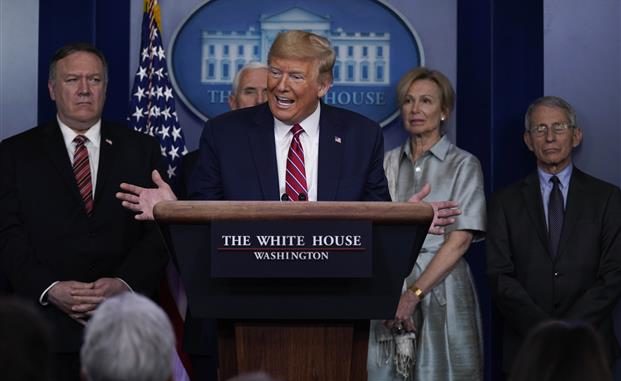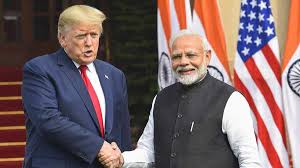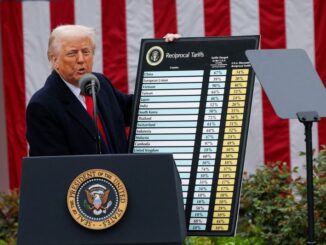
Most Americans to get 2 installments of $1200.00 checks, based on their income
Large part of stimulus money to go to businesses
WASHINGTON (TIP): The proposed legislation the details of which remain in flux, could exceed $1 trillion. It may include direct payments to individuals, small-business lending, payroll tax cuts, and credit facilities for larger businesses and commercial paper facilities.
The “phase three” bill unveiled by Senate Republicans on Thursday, March 19 includes rebates of $1,200 for most individuals who reported less than $75,000 on their 2018 tax returns, or $2,400 per couple who filed their taxes jointly and made less than $150,000.
Another $500 would be added for every dependent child. Low-income Americans with at least $2,500 of qualified income, but who do not earn enough to pay income tax, get a smaller benefit of $600, or $1,200 for couples.
The payments would be gradually phased out for individuals with income between $75,000 and $99,000, at which point payments cut off.
In a speech on the Senate floor Thursday, March 19 afternoon, McConnell said he hoped this “bold new proposal” would receive “bipartisan respect and mutual urgency.” He added that discussions between Republicans and Democrats about this legislation needed to occur on a “member level,” and said that Republican committee chairmen would begin speaking with their Democratic counterparts tomorrow.
“These are urgent discussions. They need to happen at a member level and they need to happen starting right now,” McConnell said.
McConnell told reporters Friday that he had given the bipartisan groups of senators negotiating the legislation a midnight deadline to get to an agreement, and he would take basic procedural measures so the legislation could be brought to the Senate floor. He also said that he planned for senators to draft the final legislation on Saturday.
Some of the credit facilities for larger businesses will go to industries the government is looking to aid.
Several companies and industries are seeking relief. They include the U.S. travel and tourism industry, which is seeking $150 billion in aid, the U.S. airline industry which is seeking government aid of more than $50 billion, and Boeing and is seeking $60 billion for itself and the aerospace supply chain.
The administration has made clear it is intent on helping those industries in particular that have been pummeled by travel restrictions. Trump said in a news conference Tuesday, March 17 that the challenges facing the industry are not its fault.
Lawmakers on both sides of the aisle have supported offering relief to certain industries, particularly airlines, which have drastically cut back capacity as the coronavirus and resulting travel restrictions spread. Defenders of industrywide bailouts think collapses would hurt workers as well as executives. Airlines, in particular, are viewed as essential to the U.S economy, supporting 750,000 jobs and local hubs throughout the country.
“Central banks need to work with major financial institutions to target cheap credit to vulnerable businesses — airlines, hotels, manufacturers paralyzed by broken supply chains and the like,” wrote Damon Silvers director of policy and special counsel for the AFL-CIO.
Treasury Secretary Steven Mnuchin has told GOP senators that unemployment could reach 20% if Congress doesn’t enact the administration’s proposed stimulus package.
A number of Democrats, however, have said they will not support any bailout of an industry that doesn’t come with sacrifice from companies.
Sen. Elizabeth Warren of Massachusetts on Tuesday, March 17 outlined her own set of stipulations for any big business that receive federal bailout money. They include permanently giving up stock buybacks and adding at least one seat to the board representing workers.
There have also been continued disputes between the two parties over paid leave for workers. Democrats have pushed hard to offer all U.S. workers the ability to stay home during the pandemic without fear of losing a paycheck. Republicans, though, have argued that certain small businesses may not be able to afford that service, while cash flow freezes up.
Treasury Secretary Steve Mnuchin, White House economic adviser Larry Kudlow and Legislative Affairs Director Eric Ueland are also at the Capitol on Friday to work with both parties on reaching an agreement.
Republican Senator Lindsey Graham, a staunch ally of the president who has voiced opposition to giving direct cash rebates to American citizens, warned on Friday that the final bill could be “a hell of a lot more than $1 trillion.”
“I talked to Mnuchin this morning, here’s the challenge here. We gotta tell the public the truth, we’re going to be floating probably 70% of the nation’s payroll,” Graham said. “The federal government is going to underwrite probably 70% of the payroll in this country if the containment policies continue to be this aggressive. Nobody’s ever thought of that before, nobody’s ever done that before, it’s gonna be a hell of a lot more than $1 trillion.”
McConnell explained Senate Republicans’ approach in a speech previewing the proposal on the Senate floor Thursday morning, laying out “four pillars” of the massive spending package: relief for small businesses, cash assistance for taxpayers, loans to businesses in major industries and resources to combat the virus itself. Republican senators met over lunch on Capitol Hill to hammer out the particulars.
Congressional efforts to address the impacts of the coronavirus come amid the first indications that the outbreak is prompting widespread job loss on a scale not seen since the 2008 financial crisis. The number of people filing for unemployment benefits shot up last week, an increase that is “clearly attributable to impacts from the COVID-19 virus,” according to the Department of Labor. In the week ending on March 14, the number of jobless claims was 281,000, an increase of 70,000 from the previous week.
As the pandemic shuts down business across the county, the surge in newly laid off workers is crashing states’ unemployment websites. In Ohio alone, more than 48,000 people applied for jobless benefits during the first two days of this week — 26 times the amount from the week before.
As of Thursday evening, there were over 12,500 confirmed cases of the coronavirus across every state in the U.S., and more than 175 people have died.
The Senate Republicans’ bill largely squares with the Trump administration‘s request. In a memo on Wednesday, the Treasury Department laid out what it hoped to see in the bill, asking for two rounds of direct cash payments to taxpayers, worth $250 billion each. The first payment would be made April 6, and the second would come on May 18 if the crisis hasn’t abated.
On Thursday morning, McConnell said the cash infusion “would complement unemployment insurance and could be put toward immediate needs during this crisis.”
“For Americans who are still working, the money would provide some extra certainty in this uniquely uncertain time,” he added.
McConnell said some of the small business loans would be forgiven if used to retain workers or cover basic operational expenses. “The portions of these funds that small businesses use on core expenses such as paying workers and paying their rent or mortgage will convert into grants they will not need to pay back,” he said.
McConnell had tasked three working groups to develop the proposed phase three legislation, which serves as the jumping-off point for negotiations with Democrats. After the text of the proposal emerged, Senate Minority Leader Chuck Schumer, who has called for a “Marshall Plan” to address the crisis, spoke on the Senate floor.
“We will look at it and read it tonight. But from what I’m told, it provides a bailout for a number of industries. Again, we have to put the workers first,” Schumer said, who earlier called for both sides to come together “from the get-go so any final product can pass as swiftly as possible.”
However, Schumer and Speaker Nancy Pelosi expressed concerns about the proposal in a joint statement released Thursday night.
“We are beginning to review Senator McConnell’s proposal and on first reading, it is not at all pro-worker and instead puts corporations way ahead of workers,” Pelosi and Schumer said.
At the other end of Pennsylvania Avenue, President Trump said during a briefing with members of the White House coronavirus task force that Republicans and Democrats in Congress were “pulling together.”
“I hope everything’s going good on the Hill. Maybe I shouldn’t say this until I check out what’s going on because you never know,” Mr. Trump said.
(With inputs from agencies)





Be the first to comment